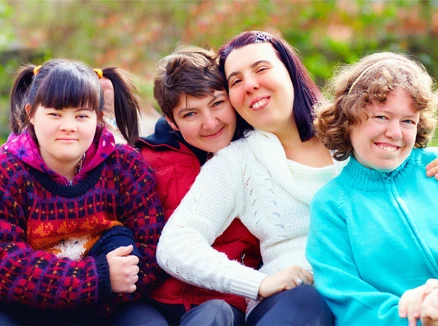Working with community
Some examples of best practice when working with this community.
Best practice
While there have been strategies implemented to address cancer screening and disability both in Australia and internationally, to date these have not been properly evaluated.
The following have been identified by the needs analysis performed by Cancer Council Victoria as critical to empowering people with disability as well as their support networks, to participate in cancer screening. It is important to ensure a whole-of-system approach is taken to promote screening to people with disability, health professionals, families and support people.
It is also important that programs are co-designed with people with disability and that people with disability are provided with support to meaningfully participate in the co-design process.
Increasing access at health services
GPs play an important role in enabling people with disability to participate in cancer screening pathways, including associated pathways. It is important for GPs to consider risk factors and the ability of the individual to undergo screening, diagnostic assessment and cancer treatment when discussing suitability with individuals progressing through cancer screening and associated pathways. More information is available on this webpage.
Accessible facilities should be standard in GP clinics and health services. This includes provision of adjustable beds and hoists, as well as accessible toilets, signs, walkways and parking.
Healthcare workers should always take care to speak directly to the person with disability, not family members or support workers.
Medical receptionists are encouraged to ask at point of appointment-making whether the patient has disability and/or any access requirements. For example, longer appointment times, requesting a female doctor, or booking of treatment rooms with height-adjustable beds. Referral letters should include information about any access requirements or considerations to ensure patients receive the appropriate service during diagnostic assessments.
Health services staff of all levels (receptionists, radiographers, GPs, nurses) throughout the entire screening process should be trained on how to ensure people with disability can safely, respectfully and equitably access screening services. Training on engaging with women with disability on cervical screening is available at the National Cervical Screening Program toolkit.
Ensure professional support workers (when required), as well as interpreters (when required), are present for appointments. Relying on friends and family is not best practice and can result in messages being miscommunicated.
Mobilising participation among people with disability
Make accessible resources available, considering differing access needs (e.g. Easy English resources for people with intellectual disability; large print or braille for people who are blind or have low vision).
Cancer Council Victoria has a range of resources available on this webpage.
General practices can identify women and people with a cervix with disability who are under-screened or never-screened and flag them in the practice database. Tailored resources can be sent out (e.g. invitation and recall/reminder letters in plain English, diagrams, large print materials, videos as required) to encourage participation.
Family members and support workers can be provided with more information on the importance of cancer screening and the skills to promote screenings to the people they support. An online learning program is available on Family Planning NSW website.
Day services, residential services and community groups provide opportunities to promote cancer screening. Consider running peer education programs where people with disability are equipped to educate others about cancer screening in a sustainable way, by increasing awareness and mobilising participation.
Involving people with disability in decision making
Informed consent is a person’s agreement to allow something to happen to them (i.e. cancer screening) based on full disclosure of risks, benefits, alternatives and consequences of refusal. For some people with an intellectual disability this can be difficult, or impossible to obtain.
For some health professionals, families or support workers, it can be difficult to explain a procedure to a person with intellectual disability. Where appropriate, use a modified communication style appropriate for each person (i.e. using clear, short, direct language) and make use of accessible materials to communicate the procedure.
Down Syndrome Victoria was one of four partner disability organisations that worked with Cancer Council Victoria in 2024-2025. You can view Down Syndrome Victoria's adapted presentations on bowel and cervical screening delivered with and for people with Down syndrome here:
It is important to note that health practitioners need a patient’s consent before providing medical treatment. If a patient does not have decision-making capacity to make a medical treatment decision, the Medical Treatment Planning and Decisions Act 2016 sets out the process for health practitioners. Information on the process is available at the Office of the Public Advocate.
